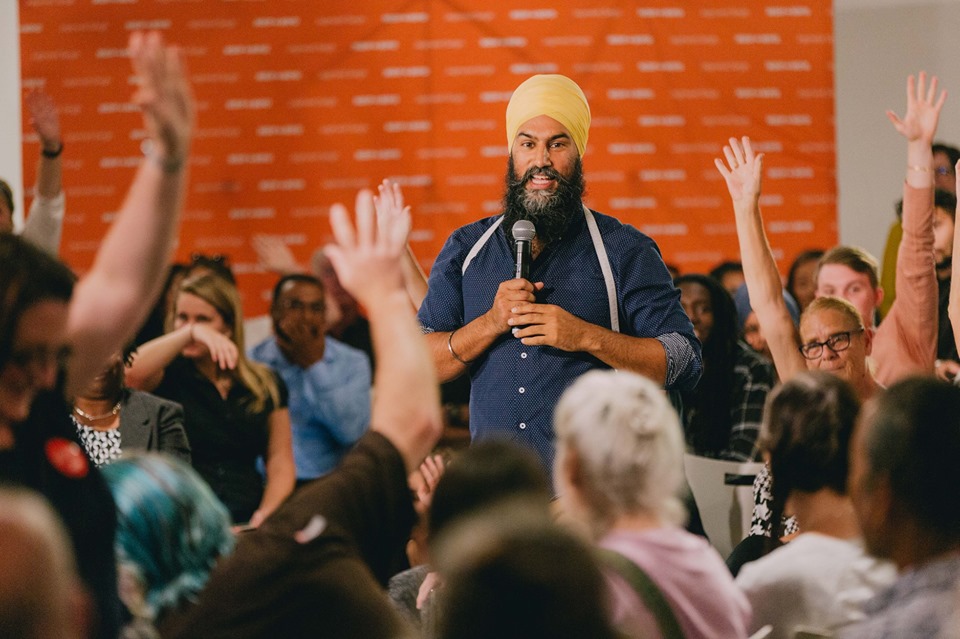For what it’s worth (probably not much), I’ve switched my vote on October 21 back from the Greens to the NDP.
This is not because I no longer believe that climate change is by far the most crucial issue facing voters in this election, or that the Greens are the only party treating it with the urgency it deserves. My opinion on these two points remains unchanged.
However, I now have two compelling reasons for flip-flopping back to the NDP. The first is that NDP Leader Jagmeet Singh has effectively developed into a far more articulate and persuasive champion of left-wing policies than I had anticipated — and with a delightful sense of humour as well. His quip during the only English debate about the squabbling between Liberal Leader Justin Trudeau and Conservative Leader Andrew Scheer — “Mr. Delay and Mr. Deny arguing over which would be worse for the country” — even drew chuckles from the studio audience.
The second reason is that, under his leadership, the NDP has significantly surpassed the Greens in voting support. This will position the NDP — rather than the Greens — to gain the balance of power in what is almost certain to be a minority government, and most likely a re-elected Liberal one.
Such leverage will enable the NDP to force Trudeau to actually keep some of his promises this time, and even adopt key progressive proposals, including the overriding need to curb climate change. Singh may not be as passionate as Green party Leader Elizabeth May about seriously tackling the climate crisis, but he shares her conviction that it should be made a top priority.
Notably, the last time the NDP held this balance of power over a minority Liberal government was after the election of 1972. That’s when Justin’s father, Pierre, fell a few seats short of winning a majority, mainly because the NDP led by David Lewis denied him those seats.
During that election campaign, Lewis rallied a lot of additional support for the NDP. He was a magnificent speaker. His forceful attack on powerful business leaders, whom he repeatedly derided as “corporate welfare bums,” drew larger crowds to his rallies. Apparently, a significant number of them who traditionally voted Liberal were induced by Lewis’s eloquence to convert to the NDP.
Trudeau’s subsequent failure to win and exercise power left him no choice but to accept Lewis’s offer to prop him up. Being a truly liberal Liberal most of the time, he willingly — even enthusiastically — collaborated with Lewis. Policy discussions between the two parties were so frequent and congenial that the relationship came close to forming a coalition during the 18 months it lasted.
Several of the NDP’s proposed legislative initiatives were promptly enacted, including a national housing program, the creation of Petro-Canada as a Crown corporation, and the indexing of old-age pensions to the cost of living.
Pierre’s son, however, is far from being his duplicate when it comes to truly progressive or even ethical governance. Given his servile embrace of large corporations and his authoritarian dismissal of dissenting views, it is highly unlikely that he would welcome an NDP “partner” in a minority parliament.
Whether he will be compelled to do so if he winds up with a minority remains conjectural until the evening of October 21.
Until then, it’s Canada’s future that hangs in the balance.
Ed Finn grew up in Corner Brook, Newfoundland, where he worked as a printer’s apprentice, reporter, columnist and editor of that city’s daily newspaper, the Western Star. His career as a journalist included 14 years as a labour relations columnist for the Toronto Star. He was part of the world of politics between 1959 and 1962, serving as the first provincial leader of the NDP in Newfoundland. He worked closely with Tommy Douglas for some years and helped defend and promote medicare legislation in Saskatchewan.
Image: Jagmeet Singh/Facebook



